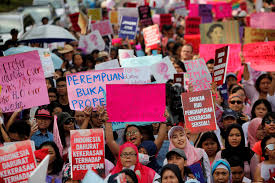
Footsteps
Tracing the Footsteps of Women’s Independence: Highlighting Kartini’s Struggle for Women’s Rights and Gender Equality in Indonesia.
Raden Adjeng Kartini, a name synonymous with the fight for women’s rights in Indonesia, serves as a beacon of inspiration for generations. Her journey, though confined within the walls of the colonial era, sparked a revolution in the way Indonesian women perceived themselves and their place in society. This essay traces the footsteps of women’s independence in Indonesia, highlighting Kartini’s pivotal role in igniting the flame of gender equality.
Born in 1879, Kartini’s life was shaped by the rigid social norms of the time. Javanese women were largely confined to domestic duties, with limited access to education and a voice in societal matters. However, Kartini’s exposure to Dutch education through her aristocratic background sparked a curiosity that challenged these norms.
Kartini’s awakening was fueled by her literary pursuits. Through correspondence with Dutch friends and acquaintances, she discovered a world brimming with ideas about women’s empowerment and social justice. These exchanges exposed her to the stark contrast between the opportunities afforded to European women and the limitations placed upon Indonesian women.
Fueled by this newfound awareness, Kartini’s perjuangan (struggle) began. Her letters, compiled posthumously as “Habis Gelap Terbitlah Terang” (Out of Darkness Comes Light), became a powerful testament to her yearning for education and freedom. Kartini believed that education was the key to unlocking women’s potential and enabling them to participate actively in society.
Despite societal restrictions that confined her to the inner quarters (pingitan), Kartini defied limitations. She established clandestine schools in her own home, educating girls in basic literacy, sewing, and handicrafts. These schools, though small, served as a powerful symbol of defiance against the status quo.
Kartini’s legacy extends far beyond her immediate actions. Her writings resonated with a generation of women yearning for change. Following her untimely death in 1904, the Kartini movement gained momentum. Schools for girls began to flourish, and women started to raise their voices for equal rights.
Kartini’s influence is undeniable. Today, Indonesia boasts a thriving community of women professionals, entrepreneurs, and activists. However, the journey towards true gender equality is far from over. Issues like domestic violence, workplace discrimination, and unequal access to education persist.
In conclusion, Kartini’s story serves as a powerful reminder of the ongoing struggle for women’s rights in Indonesia. Her courage, determination, and unwavering belief in education paved the way for generations of women to pursue their dreams. As Indonesia continues to progress, her legacy serves as a guiding light, urging the nation to strive for a future where women and men stand together, as equals.
Kartini’s impact transcended geographical boundaries. Her ideas resonated with women across Southeast Asia, inspiring similar movements for social reform and women’s education. In Indonesia, her legacy continues to be celebrated through annual Kartini Day commemorations, a national holiday that serves as a powerful symbol of women’s empowerment.
However, it’s crucial to acknowledge that Kartini’s vision was not without limitations. Criticisms point to her aristocratic background and the influence of Dutch colonial ideals on her ideas. While her advocacy for education was instrumental, some argue for a more nuanced understanding of women’s empowerment that considers the experiences of women from diverse social classes and ethnicities.
Despite these limitations, Kartini’s significance remains undeniable. Her fight for education opened doors for countless women and ignited a conversation about gender equality that continues to this day. Her story serves as a springboard for contemporary feminists to address issues that were beyond her purview, such as economic disparity, political participation, and reproductive rights.
By critically examining Kartini’s legacy and its complexities, we can ensure her fight continues to inspire future generations. Her unwavering belief in the transformative power of education serves as a timeless message, urging us to invest in girls’ education and create a world where all women can reach their full potential. In conclusion, Kartini’s footsteps serve as a map for the ongoing journey towards gender equality in Indonesia, a journey that requires constant evaluation and progress.
By: Nimas Ayu N.M
Write and Win: Participate in Creative writing Contest & International Essay Contest and win fabulous prizes.


